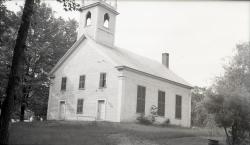Knights of Pythias
The Knights of Pythias was another post-Civil War fraternal organization and secret society founded at Washington, DC, in 1864. The Knights of Pythias received its charter through an act of the US Congress. It was founded by Justus H. Rathbone, who had been inspired by a play by the Irish poet John Banim about the legend of Damon and Pythias. This legend illustrates the ideals of friendship, benevolence, and charity that are the cornerstones of the order.

Congregational Church, Strong, ca. 1950
The Congregational Church was built in 1848 on a knoll overlooking Depot Street and Main Street. The church was dedicated in 1849. For more than 100 years, it served its members, but due to economic reasons and declining membership, the church was decommissioned and sold in 1951. For the next forty years, it served as the Masonic Hall of the Davis Lodge, A.F. & A.M. Today, it is privately owned.Strong Historical Society
Masonic History
Masonry first came to America from settlers who carried the tradition from the British Isles. The early Scottish settlers in Nova Scotia came from the Lodge of Edinburgh. In 1704, Johathan Belcher, later Governor of Massachusetts, was made a Freemason in London. In 1762, the first lodge was granted permission to convene in Falmouth, but the Revolutionary War stymied the establishment of other Masonic lodges.
In October, 1775, the town of Falmouth was attacked, and more than half the town was burned. Over 400 buildings were destroyed and more than 1,000 people lost their homes.
Yet, according to masonic records, from 1775 to 1786, the Grand Lodge either admitted to membership or conferred degrees on 32 additional members. maine was not yet a state, so Lodges were under jurisdiction of Massachusetts.

Members of Davis Lodge 191, AF&AM, Strong, cr. 1908
Front Row, L-R: Winthrop L. Guile, Fred E. McLeary, Leslie A. Vining, Charles Pease, Abner W. Mayo, Horatio N. Luce, John W. Durrell, W. H. Conant, Clyde E. Durrell, Stephen D. Gates, William H Hunter, Robert Keefe, George Hartwell, William I Smith, Jesse E Phillips, William E Bates, Walter G Durrell. Second Row: Charles F Thompson, Philip D Stubbs, Nelson Walker, Percy M Brown, Llewellyn Hartwell, Frank H Smith, Richard E Burns, Frank E Howard, C. B. Luce, William H. Allen, A. W. Norton, Orrin P. Walker, C. H. Hinds, Ray Spaulding. Back Row: Frank O. Welch, C. W. Shaw, U. G. Weymouth, Percival W. Mason, Clinton V. Starbird, Charles H. Cunningham, Lewis L. Partridge, Elliott W. Loring, Frank E. Vaughan, Gilbert Eustis, Alton B. Tucker, Henry E. Mayo, H A Durrell, Austin T. Voter, James H. Conant, Allen G. Eustis, Ernest W. Vining. Strong Historical Society
In 1820, delegates of 24 Lodges assembled at Masons' Hall in Portland to organize the Most Worshipful Grand Lodge of Maine. The Honorable William King, Governor of the State, was elected Grand Master of Masons. The Governor, accompanied by the President of the Senate and the Speaker of the House of Representatives, both of whom were Masons, assumed the chair.
Strong had an active Masonic Lodge, but its history has not been well documented. Many Maine Masonic Lodges have consolidated, and the Davis Lodge, Ancient, Free and Accepted Masons, combined with the Phillips Lodge, and the building was sold.